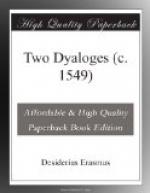* * * * *
A declaracion of the names.
Poliphemus
sygnifieth, valyant
or noble, and
in an other sygnifi-
cacion, talcatyfe or clybbe of tong.
The
name of a Gyant
called Cyclops, ha-
uynge but one eye in
his forhed, of a
huge stature and a myghtie
personage.
And is aplyed here to sygnifie
a great
freke or a lubber, as
this Poliphemus
was, whiche beynge
a man of warre or
a courtyer, had a newe
testament in his
hande, and
loked buselie for some
sentence
or text of scrypture
and
that Cannius his
companyo
espyed
and
sayd to
hi
as fo-
loweth.
* * * * *
[C]The parsons names are Cannius and Poliphemus.
Cannius. what hunt Polipheme for here? Poliphemus. Aske ye what I hunt for here, and yet ye se me haue neyther dogges, dart, Jauelyn, nor huntyng staffe. Cannius. Paraduenture ye hunt after some praty nymphe of the couert. Poliphemus. By my trouth and well coniectured, be holde what a goodly pursenet, or a hay I haue here in my hande. Cannius. Benedicite, what a straunge syght is this, me thinke I se Bachus in a lyons skin, Poliphemus with a boke in his hande. This is a dogge in a doblet, a sowe with a sadle, of all that euer I se it is a non decet. Poliphe. I haue not onely paynted and garnyshed my boke with saffron, but also I haue lymmed it withe Sinople, asaphetida, redleed, vermilo, and byse. Can. It is a warlyke boke, for it is furnished with knottes, tassils ||plates, claspes, and brasen bullyons. Poliphe. Take the boke in your hand and loke within it. Canni. I se it wery well. Truly it is a praty boke, but me thynkes ye haue not yet trymmed it sufficiently for all your cost ye have bestowed upon it. Poliphe. Why what lackes it? Canni. Thou shuldest haue set thyne armes upon it. Poliphemus. what armes I beseche the? Canius. Mary the heed of Silenus, an olde iolthed drunkard totynge out of a hoggeshed or a tunne, but in good ernest,




